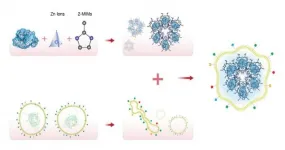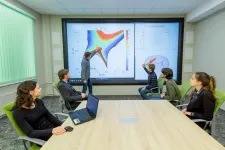(Press-News.org) With the advent of 5G communication technology and its integration with AI, we are looking at the dawn of a new era in which people, machines, objects, and devices are connected like never before. This smart era will be characterized by smart facilities and services such as self-driving cars, smart UAVs, and intelligent healthcare. This will be the aftermath of a technological revolution.
But the flip side of such technological revolution is that AI itself can be used to attack or threaten the security of 5G-enabled systems which, in turn, can greatly compromise their reliability. It is, therefore, imperative to investigate such potential security threats and explore countermeasures before a smart world is realized.
In a recent study published in IEEE Network, a team of researchers led by Prof. Hyunbum Kim from Incheon National University, Korea, address such issues in relation to an AI-based, 5G-integrated virtual emotion recognition system called 5G-I-VEmoSYS, which detects human emotions using wireless signals and body movement. "Emotions are a critical characteristic of human beings and separates humans from machines, defining daily human activity. However, some emotions can also disrupt the normal functioning of a society and put people's lives in danger, such as those of an unstable driver. Emotion detection technology thus has great potential for recognizing any disruptive emotion and in tandem with 5G and beyond-5G communication, warning others of potential dangers," explains Prof. Kim. "For instance, in the case of the unstable driver, the AI enabled driver system of the car can inform the nearest network towers, from where nearby pedestrians can be informed via their personal smart devices."
The virtual emotion system developed by Prof. Kim's team, 5G-I-VEmoSYS, can recognize at least five kinds of emotion (joy, pleasure, a neutral state, sadness, and anger) and is composed of three subsystems dealing with the detection, flow, and mapping of human emotions. The system concerned with detection is called Artificial Intelligence-Virtual Emotion Barrier, or AI-VEmoBAR, which relies on the reflection of wireless signals from a human subject to detect emotions. This emotion information is then handled by the system concerned with flow, called Artificial Intelligence-Virtual Emotion Flow, or AI-VEmoFLOW, which enables the flow of specific emotion information at a specific time to a specific area. Finally, the Artificial Intelligence-Virtual Emotion Map, or AI-VEmoMAP, utilizes a large amount of this virtual emotion data to create a virtual emotion map that can be utilized for threat detection and crime prevention.
A notable advantage of 5G-I-VEmoSYS is that it allows emotion detection without revealing the face or other private parts of the subjects, thereby protecting the privacy of citizens in public areas. Moreover, in private areas, it gives the user the choice to remain anonymous while providing information to the system. Furthermore, when a serious emotion, such as anger or fear, is detected in a public area, the information is rapidly conveyed to the nearest police department or relevant entities who can then take steps to prevent any potential crime or terrorism threats.
However, the system suffers from serious security issues such as the possibility of illegal signal tampering, abuse of anonymity, and hacking-related cyber-security threats. Further, the danger of sending false alarms to authorities remains.
While these concerns do put the system's reliability at stake, Prof. Kim's team are confident that they can be countered with further research. "This is only an initial study. In the future, we need to achieve rigorous information integrity and accordingly devise robust AI-based algorithms that can detect compromised or malfunctioning devices and offer protection against potential system hacks," explains Prof. Kim, "Only then will it enable people to have safer and more convenient lives in the advanced smart cities of the future."
INFORMATION:
Reference
Authors: Hyunbum Kim (1), Jalel Ben-Othman (2,3), Lynda Mokdad (4), Junggab Son (5) and Chunguo Li (6)
Title of original paper: Research Challenges and Security Threats to AI-Driven 5G Virtual Emotion Applications Using Autonomous Vehicles, Drones, and Smart Devices
Journal: IEEE Network
DOI: 10.1109/MNET.011.2000245
Affiliations:
(1) Incheon National University
(2) Université Paris-Saclay
(3) University of Sorbonne Paris North
(4) University of Paris-Est
(5) Kennesaw State University
(6) Southeast University
About Incheon National University
Incheon National University (INU) is a comprehensive, student-focused university. It was founded in 1979 and given university status in 1988. One of the largest universities in South Korea, it houses nearly 14,000 students and 500 faculty members. In 2010, INU merged with Incheon City College to expand capacity and open more curricula. With its commitment to academic excellence and an unrelenting devotion to innovative research, INU offers its students real-world internship experiences. INU not only focuses on studying and learning but also strives to provide a supportive environment for students to follow their passion, grow, and, as their slogan says, be INspired.
Website: http://www.inu.ac.kr/mbshome/mbs/inuengl/index.html
About the author
Hyunbum Kim received his Ph.D. degree in computer science from the University of Texas at Dallas, USA, in 2013. He is currently with the Department of Embedded Systems Engineering and is the founder of the Intelligent Computing & Next Generation Systems Lab at Incheon National University, South Korea. His research interests include algorithm design and performance analysis in various areas including an AI-driven Internet of Things, intelligent computing, virtual emotion systems, unmanned aerial vehicles, smart cities, next generation systems, and cyber security.
Researchers at the University of Virginia School of Medicine have shed light on what causes herpes simplex virus to flare up, explaining how stress, illness and even sunburn can trigger unwanted outbreaks.
The discovery could lead to new ways to prevent cold sores and herpes-related eye disease from reoccurring, the researchers report.
"Herpes simplex recurrence has long been associated with stress, fever and sunburn," said researcher Anna R. Cliffe, PhD, of UVA's Department of Microbiology, Immunology and Cancer Biology. "This study sheds light on how all these triggers can lead to herpes simplex-associated disease."
About Herpes Simplex ...
Joe Biden is the new president of the United States, although half of the country's Republicans believe he stole the election. A lot of people believe conspiracy theories on the other side of the Atlantic. But they aren't only found there.
Conspiracy theories are not exclusive to people who storm the U.S. Capitol.
"Everyone believes at least one conspiracy theory," says Asbjørn Dyrendal, a professor in NTNU's Department of Philosophy and Religious Studies who specializes in conspiracy theories.
The more conspiracy theories you bring up, the more people answer yes to one of them.
That fact leads ...
Loading a cancer immunotherapy drug onto a metal organic framework improves both its delivery and its sustained release for treating leukemia. Furthermore, coating the drug-loaded framework with a cancer cell membrane improves targeted delivery to solid tumors. These findings could lead to safer and more reliable cancer immunotherapies.
"We believe our findings are quite significant because they show that the undesirable side effects of immunotherapy can be modulated by choosing the right delivery vehicle," says KAUST chemist Niveen Khashab. "They also show that targeted delivery can be realistically established through proper surface functionalization." ...
The energy of the future lies in the area of the controlled thermonuclear fusion. The scientific group from Peter the Great St.Petersburg Polytechnic University (SPbPU), headed by Professor Vladimir Rozhansky, is directly involved in the establishment of the world's largest experimental thermonuclear reactor ITER. Researchers discovered new effects, which affect the energy flow in the reactor. The theoretical predictions were confirmed by the experiments on two tokamaks. The research results were published in the scientific journal "Plasma Physics and Controlled Fusion".
The scientific group of Polytechnic University is engaged in modeling of the edge plasma. The researchers aim to identify how and ...
In the early days of the COVID-19 pandemic, it was established that SARS-CoV-2 infects cells by binding to the human protein ACE2, which plays a role in regulating blood pressure. But ACE2 is almost absent in human lung cells, so how can the lungs be one of the most affected organs in COVID-19? This gave researchers a hint that ACE2 might be more than just a blood pressure regulator, and might not be the only player in the SARS-CoV-2 infection mechanism.
EMBL's Gibson team, in collaboration with Lucía Chemes at Universidad Nacional de San Martín in Buenos Aires and ...
Research from the Business School (formerly Cass) suggests that observing others' decision-making can teach people to make better decisions themselves.
The research, co-authored by Professor Irene Scopelliti, Professor of Marketing and Behavioural Science, tested the effectiveness of a new debiasing training strategy and reports first evidence that watching others make decisions can improve our own decision making.
The authors carried out three experiments, which involved participants making a set of judgements before and after a training intervention designed to improve their decision-making.
Experiment ...
A study led by researchers at Lund University in Sweden showed a connection between lifestyle intervention in pregnant women with obesity and epigenetic alterations in the baby. The study is published in the journal Diabetes.
An international collaboration between researchers in Sweden, Denmark and Spain investigated whether children's genes were programmed differently if a pregnant woman with a BMI over 30 underwent lifestyle interventions.
The study involved 425 pregnant women, all of whom have a BMI over 30, which is defined as obesity. They were divided at random into three different groups:
Group 1 had a lifestyle intervention that included both physical activity (they were urged to walk 11 000 steps per day and use a step counter) and a ...
Those with asthma are experiencing less asthma control related to an increase in using household disinfectants -- known asthma triggers -- because of COVID-19, according to a survey co-conducted by University of Illinois Chicago researchers.
"We became concerned with increased cleaning and disinfecting related to the COVID-19 pandemic, combined with people spending more time indoors may expose people with asthma to more environmental triggers for asthma symptoms," Eldeirawi said. "This prompted our interest in studying the impact of disinfectants and asthma control among those living with asthma."
Cleaning products are considered respiratory irritants that cause inflammation and bronchial hyperresponsiveness, Eldeirawi explained. ...
American athlete Tom Brady has done the seemingly impossible, winning his seventh Super Bowl at the age of 43 in spectacular fashion. He's joined by stellar company: At 39, Serena Williams has won 23 grand slams, one of them while pregnant.
The reasons for age-defying athletic performances are dependent on numerous factors, including diet, but a new study by Iranian and University of South Australia researchers shows that when it comes to track and field events, the age when athletes peak often depends on the sport.
Discus and javelin throwers as well as marathon runners and race walkers are likely to achieve their best performances at a later age than sprinters, hurdlers and ...
Australian researchers have come up with two key recommendations from studies of the annual influenza season - one highlighting the benefits of antivirals in reducing repeat hospitalisation, and the other to watch for underlying cardiovascular disease.
While the world focuses on the rising COVID-19 death toll, seasonal influenza continues to cause significant mortality and poses a significant economic burden every year.
The South Australian study, conducted at two major metropolitan training hospitals between January 2016 and March 2020, collected data from 1,828 adult patients (average age around 66) who were hospitalised with influenza A and B.
Researchers compared outcomes for patients who did and did not take the antiviral ...





